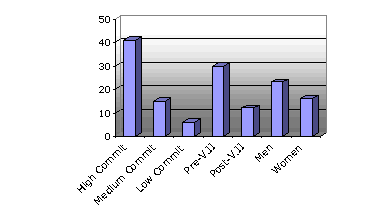A Quick Question
Are Catholics' practices changing?
The quick answer: Yes, rapidly in a consistent and identifiable pattern.
The longer answer: The new book, American Catholics: Gender, Generation, and Commitment, provides clear evidence of changing trends among American Catholics from the time of Pope John Paul II's visit in 1987 to the time just before the new millennium. As the book's title suggests, gender, generation, and commitment prove to be the three key variables impacting the findings.
Most analysts, and newspaper columnists use Mass attendance as their measure of commitment to the Church. Using a more stringent three item index, the authors measured the level of individual commitment to the Roman Catholic Church. To create this commitment scale, they combined:
- Mass attendance,
- One's attitude toward leaving the Church, and
- a person's evaluation of the Church as an important part of his or her life.
The highly committed on this scale look considerably different than those who are defined by their weekly Mass attendance, as the table shows:
| |
1987 |
1993 |
1999 |
| Weekly Mass attendance |
44% |
43% |
37% |
| Highly committed Catholics |
27% |
23% |
23% |
In 1999, highly committed Catholics were more likely to be women (27%) than men (19%) and from earlier generations -- 40% of Pre-Vatican II Catholics (born before 1940), 27% of Vatican II Catholics (b. 1940-1960), and only 14% of Post-Vatican II Catholics (1961+).
This new book is the third in a series based on three Gallup-commissioned surveys carried out by the authors in 1987, 1993 and 1999. The earlier volumes were published in 1989 (American Catholic Laity in a Changing Church), and 1996 (Laity, American and Catholic, Transforming the Church). From the beginning, this research intended to develop a trend analysis by repeating critical questions in each survey. 
From this research, the following trends are clear:
- There is strong acceptance of core beliefs like sacraments, resurrection, real presence of Christ in the Eucharist;
- There is declining support for the teaching authority of the Vatican on issues ranging from sexuality to priesthood celibacy and women's ordination;
- There is a steady decline from seeing church leaders as the single source of moral authority on such "hot-button" issues as remarriage after divorce, birth control, abortion, homosexuality, and non-marital sex.
Regarding this latter trend, the 1999 level of support for church leaders as the locus of moral authority on these 5 "hot-button" issues averaged 20%. However, this level of support varied greatly by commitment, generation and gender.
Percent Supporting Church Leaders as
Single Source of Moral Authority

Other trends in evidence were toward a reliance on one's own conscience and to a lesser extent, toward the need for dialogue between church leaders and the laity. Perhaps the most surprising finding, given all the declining support and distancing by the laity, was that less than 20% across all three generational groups revealed low commitment to the Church.
Gender, generation, and commitment clearly have an impact on Catholic identity. These variables affect the priest shortage, the possible ordination of married people and women, and what Catholics think about certain social justice issues as health care for poor children, the death penalty, nuclear arms reduction, military funding and welfare program cutbacks. However, regardless of gender, generation or commitment this study also shows overwhelming lay support for more collegiality and democratic-decision making in the Catholic Church. 
This volume provides the most complete and nuanced study of the trends in beliefs, attitudes, and behavior among American Catholics as we move into the new millennium. To read more about American Catholics: Gender, Generation, and Commitment or purchase it, visit Amazon Books.
For more information about the research, please contact:
William D'Antonio, Project Coordinator
office - 202-319-5999
fax - 202-319-6267
dantonio@cua.edu
Return to the Quick Question archive
|
